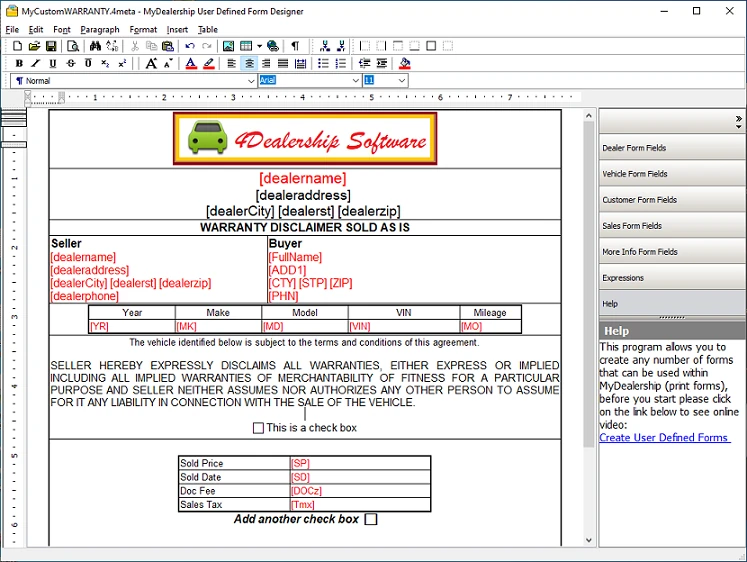A small car dealer software package will run your business more efficiently and accurately.
Car dealer software, also known as dealership management systems (DMS), includes other products that assist in the operations of automobile dealers. Our four dealerships can assist with both front- and back-office tasks and may provide tools for inventory, cost, profit, loss calculation, in-house or out-side (bank) financing, and amortization for both vehicles and customers.
Our car dealer software tools can also offer features for preparing, tracking, and storing warranty information, sales contracts, auto repairs, and recurring payments.
4Dealership's products and tools are typically used by the car lot sales team and office administrators in new or used, large, midsize, or small car lot dealerships. 4Dealership is the best car dealer solutions as billing software, inventory management software, and website publisher.
Please download for 30 days risk-free to see all screens and functionalities to make the right decision for your car dealer business.
Large, Slide View4 Dealer software includes lot financing (BHPH), wholesale, and retail, all in one. Customer payments and late payments Monthly collected sales tax, business tax, income and expense report Customer balance: payments, purchases, sales, and finance charges Sales history, inventory control (sold, active, purchased, assigned vehicles, profit and loss, etc.).
Manual dealer management systems are easy to use and cost next to nothing, just a notebook and pen with a calculator which makes them ideal for small car lot owners. Unfortunately, they cannot match the advantages of a computerized dealer management system. The latter method is less time-consuming and more accurate, allowing for better record-keeping and reporting. Both dealer management systems are based on the same principles but work differently. Computer software is almost error-free, more reliable, and unbelievably faster than searching a notebook.
We suggest you start with no monthly fees, no contract or yearly fees, and no support fee car dealer software that covers the advance and basics functionality for any buy here, pay here, retail, wholesale, out-of-state, or even rent-to-own, just like what we offer!
Manual bookkeeping has its perks.
While most car lot dealers nowadays use DMS software, some still rely on manual systems. Startups, for example, may find manual bookkeeping much cheaper and easier to use than computerized dealer sales systems. Likewise, small dealer owners who are not tech-savvy may prefer to use physical records instead of software. This approach leaves room for human error but has some distinct advantages over computerized systems.
First of all, it's convenient and easily accessible since you only need a pen and notebook. All calculations are performed manually, which eliminates the risk of duplication mistakes and corrupted data. Plus, you don't have to worry about power or internet outages. Correcting entries is easier, too. Additionally, there is no risk of data loss or leaked financial information due to data breaches. But on the negative side, manual DMS bookkeeping is prone to human error. The more manual a process is, the greater the risk of making mistakes. Inaccurate financial records can stunt car lot dealer growth and lead to regulatory fines by the IRS. They may also affect decision-making, budgeting, and other key operations.
Key Advantages of Computerized Car Lot Dealer Software (DMS)
Now that you know the advantages and disadvantages of a manual bookkeeping system, you may wonder if it's worth switching to DMS software. After all, manual DMS is cost-effective and convenient. However, electronic record-keeping ensures greater accuracy and can free up your time. Most DMS systems have built-in reporting functions, invoice templates, automatic backups, and other useful features. Plus, they reduce or eliminate human error and can handle large amounts of data.
The advantages of a computerized DMS system include faster and more efficient record-keeping and access to real-time financial data. Fast, easy in-depth reporting and analysis. This means you won't have to spend hours preparing these documents manually. Instead, you can focus on the core aspects of your business.
To avoid any audits and fines by the IRS, the IRS generally suggests businesses keep records for up to 7 years. How should businesses record transactions? A good DMS system includes a summary of all dealer transactions, purchases, sales, taxes, interests, expenses, etc. These are usually kept in the DMS as journals and ledgers, which car dealer owners can refer to whenever they want. Our software allows you to do that with a few clicks.





















